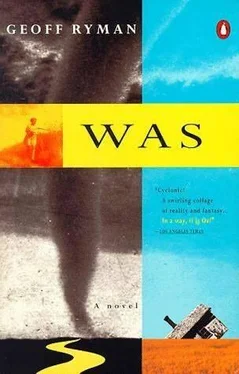Millie soon learned their language. I also picked up a few words, and it is now the most bitter sadness to me that none of us had time to write them down. I am told there is now no record or lexicon of their language-the Indians who gave their name to our state.
Sometimes odd words come swimming up to me as if from the bottom of a creek.
"Caye" meant chief. "Pi-sing" meant game. I know that "zetanzaw" meant big and "basneenzaw" meant little, which is what the Indians called my sister and myself: Big and Little.
I can remember walking with them to the river. It was not unusual in those days to see two or three hundred of them crossing the Kaw. When a party of Indians arrived at it, the men would throw themselves down onto the grass and spend the time in talking and games while the women prepared the meals and fixed things for the crossing.
I remember Millie being able to ask them in their own tongue why the men did no work, and I remember being able to understand the answer: "Big braves do not work."
The women would unpack the bundles and spread out on the ground large buffalo skins. They would then cut themselves lengths of small bushes or hickory about five or six feet long. They would use these as the frames of small boats, bending them across each other and stitching the skins in place, to make a rudderless, prowless square craft. The women would then pile into them the corn and the reed bowls and the naked children.
Then a woman would get her pony and drive it into the river. She would hold on to its tail with one hand, and the boat with the other, and in this way pull life and property across the current. The men simply swam.
I remember one night my father, my sister and I camped with them overnight. I remember the moon. I remember the smoke from the fires and from the pipes. I remember women sharpening knives and feeling no apprehension. I remember we ate a fish caught fresh from the river, a giant channel cat that must have weighed all of forty pounds-or so my father declared.
There was no whisky among them. This may have been unusual. At least my father was not supplying them with it. I remember him picking his teeth with a fishbone and trying to explain mortgages to the Kansa men, who roared with laughter.
My father was always a hero to me, but the next day, he became a hero to others. It was at the time of the June rise and the river was full to the bank. My father and I were up early, to begin the trek home. It was first light, and the women had already begun their crossing.
My father noticed one horse, with woman and boat, pull away from the crowd and start downstream. I think most of the men were asleep, and most of the other women were wrestling with the strong current, for it was my father who ran down the bank and plunged into the water. I saw him swim toward the woman and catch her by the hair, just as she went under. He pulled her back toward the bank, into the arms of some of the women. The boat went spinning downstream, a child wailing on top of it. My father went after the boat as well, which tangled with some branches overhanging the stream. By the time he had rescued the child as well, the entire camp was aroused. I can still remember the gratitude on the faces of the braves. The pony was swept away and drowned.
I grow confused in time, which seems to me to be like a river. Trying to remember is like trying to hold on to the current. It does seem to me that my father was marked for good things by the Indians because of that incident, so I think that my other memories of them must follow this incident.
To this day I think of Indians and my father in "one breath." Neither of them worked and both of them drank whisky and both of them were robbed of their birthright. In the end, both were wretched and miserable. In 1873, Congress finally took the Indians' diminished reservation, and the Kansa tribe was forced to march away from the state that bears their name. My father died the same year.
The air conditioner was clanking.
Jonathan woke up on the thick patterned coverlet of the bed, leaves of Xerox scattered all around him. His throat was horribly sore. Sitting on the chair by the desk, a plump young man looked at him. Jonathan knew his face, but from where?
"It sure is stuffy in here," said the young man. "You ought to go outside for a while."
It was the kid from the Con. "Karl," said Jonathan, sitting up.
"Hi," said Karl, grinning with his huge white teeth. "How are ya?"
"I'm not well," croaked Jonathan.
"Yeah, I heard." Karl's eyes were downcast.
Jonathan remembered and felt a flood of misgiving and guilt. "And you. Are you okay? I mean, are you well?"
"I'm okay," said Karl. "When I heard about you, I took a test. Nothing. We didn't do that much, remember?"
"Yes, yes, that's right!" Jonathan settled back onto the bed with relief. "We didn't, did we?"
"I thought you might like to know that," said Karl. "Come on, there's somebody wants to see you."
He helped Jonathan to his feet, and Jonathan fumbled woozily with the locks on the door. Outside the air was cool and sweet-smelling and seemed heavier, as if it contained more oxygen. White light glowed inside the blue swimming pool. Worms of light wriggled over the walls of the Best Western.
And Moonflower walked toward them. For some reason she was wearing a 1930s evening dress, white satin with a long train. Her small breasts hung unsupported within it. Her hair was still wild, uncombed.
"We were all real upset when we heard about you," she said.
"All of us fans," said Karl.
"Some of us used to talk to you when you weren't there," said Moonflower.
Jonathan held up a hand. "It was just a part. All you could see was the makeup."
"You became," said Karl, "an icon. We saw your picture so much, you moved from the right-hand side of the brain to the left. You stopped being a visual image, you became more like a word sign. You became a meaning."
"That's the trouble with you intellectuals," said Moonflower. She slipped the satin dress off over her head. "You always stare at the images and tell us what they mean to you. You should ask us what the signs mean. We're the people who use them. You should be doing scientific surveys, not staring at your own belly buttons."
She walked away, naked. Her legs and arms were thin, her hips and stomach already settling down with age. Seagulls in the blue light played about her hair.
"You also ought," she said, "to go swimming." She dived into the pool and disappeared amid a flurry of bubbles, white like pearls.
"Let's get some chow," said Karl. "You haven't eaten anything since Bill's last night, and you lost that."
For some reason, Jonathan already had the car keys in his hand.
The new town center was a huge shopping mall that covered the end of Poyntz Avenue, where the bank of the Blue River had once been. Jonathan walked inside and his breath was taken away.
It was glass-covered like a train station, with huge hoops of light in a row along the ceiling's pinnacle. The floor was made out of brick and there were tall fountains and shrubbery in pots and walkways leading off down avenues of shops to the closed and darkened caverns of department stores.
Jonathan walked forward with tiny, almost fearful steps, looking about him. It was late and the mall was just as deserted as the rest of the town center had been in daylight. Somewhere, echoing overhead, were the disembodied voices of children and the imprecations of adults.
He tiptoed down the main corridor, where it was narrowed by flanks of white columns, and out into a wider space. There was the sound of splashing water and emptiness. A sign hung over it. PICNIC PLACE, said the sign in neon.
In the center of Picnic Place was a black, convoluted, and somehow Italian fountain, surrounded by palm trees. Empty tables were rimmed around it. Along the walls were franchises for Mexican or Italian fast food, and for something called runzas. The voices overhead still had to find bodies. An Asian Indian woman strolled past him in a purple-and-silver sari. Her sandals made a flapping sound.
Читать дальше












